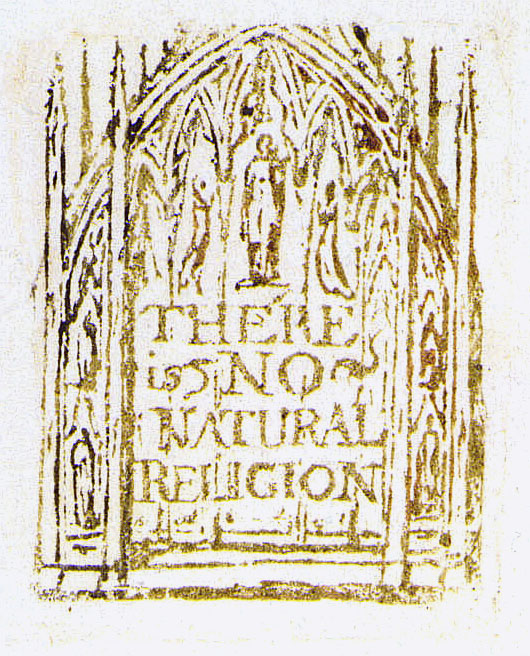
Image from Wikimedia
There is No Natural Religion
Title Page
There is No Natural Religion, (E 3)
"VII The desire of Man being Infinite the possession is Infinite & himself Infinite
Conclusion, If it were not for the Poetic or Prophetic
character. the Philosophic & Experimental would soon be at the
ratio of all things & stand still, unable to do other than repeat the same dull round over again
Application. He who sees the Infinite in all things sees
God. He who sees the Ratio only sees himself only.
Therefore God becomes as we are, that we may be as he is"
Here is a quote from Athanasius, a 4th century bishop of the Coptic Orthodox Church:
"The Son of God became man so that man might become God." (CCC #460)
The statement by Athanasius became Christian doctrine and is included in the Catholic Church Catechism. Blake's similar statement is considered by some to be a repetition of the doctrine formulated by Athanasius. A closer look will reveal the differences.
First notice that Blake is speaking in the first person, "as we are" and as "we may be". This is personal experience. This doesn't sound like doctrine because it isn't doctrine. The direction that Blake is heading is toward becoming like God through acknowledging that God becomes like us. The action, "becomes", is in the present. The idea that God "becomes" rather than that he simply "be", conforms with Blake's value of active rather than passive. In Blake's second phrase he uses the word "be" instead of become. This indicates that he is talking about the Identity, our Eternal nature which is unchanging, which goes through states and casts off error but remains the essential being.
Annotations to Reynolds, (E 655)
"Reynolds Thinks that Man Learns all that he Knows I say on
the Contrary That Man Brings All that he has or Can have Into the
World with him. Man is Born Like a Garden ready Planted & Sown
This World is too poor to produce one Seed"
Jerusalem , Plate 38, (E 184)
"the Divine-
Humanity, who is the Only General and Universal Form
To which all Lineaments tend & seek with love & sympathy
All broad & general principles belong to benevolence
Who protects minute particulars, every one in their own identity."
Jerusalem , Plate 55, (E204)
"General Good is the plea of the scoundrel hypocrite & flatterer:
For Art & Science cannot exist but in minutely organized Particulars
And not in generalizing Demonstrations of the Rational Power.
The Infinite alone resides in Definite & Determinate Identity
Establishment of Truth depends on destruction of Falshood
continually"
Vision of the Last Judgement , Page 79,(E 355)
"In Eternity one Thing never Changes into
another Thing Each Identity is Eternal...
Eternal Identity is one thing & Corporeal
Vegetation is another thing"
It is interesting to note that in the Athanasius quote that God "became", since the static "I am" represents most traditional thinking about God. Although God acts in the Old Testament he is thought to be unchanging. The third person "man" is used rather than the "we" of Blake's passage. And there is Athanasius' trinitarian reference when he speaks of "the Son of God", the second person of the trinity. Athanasius specifies "become God" whereas Blake indicates "be as he is". Actually "become God" is more gnostic than Blake's "be as he is".
If Blake were trying to duplicate the thoughts of Athanasius he would have used his words. Instead he uses his own words (slightly different from the original) to change the meaning, as he frequently does when reproducing another's statements. Subtleties, yes, but that's Blake.
No comments:
Post a Comment